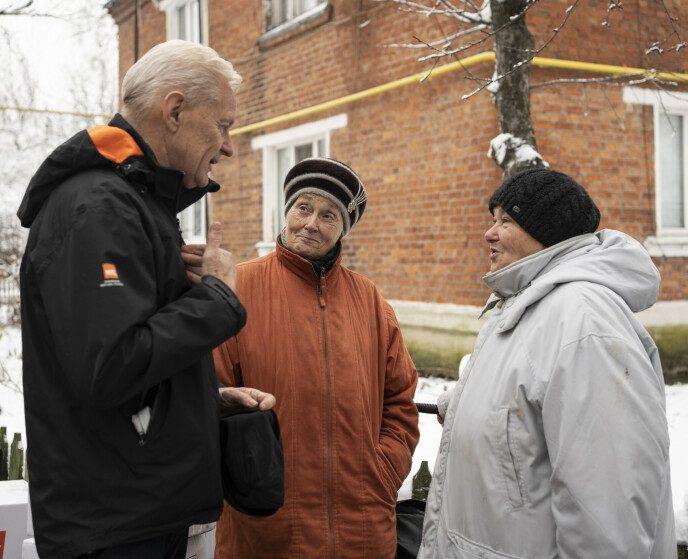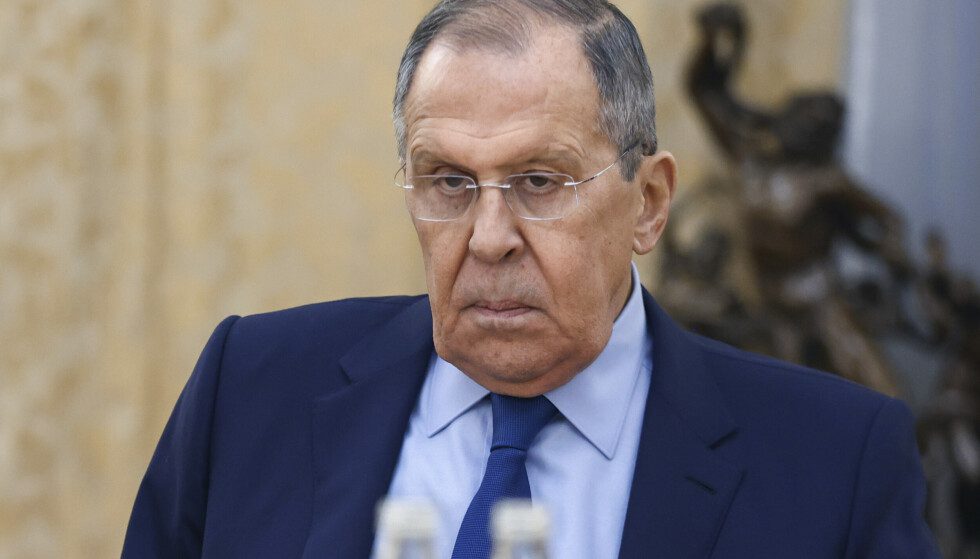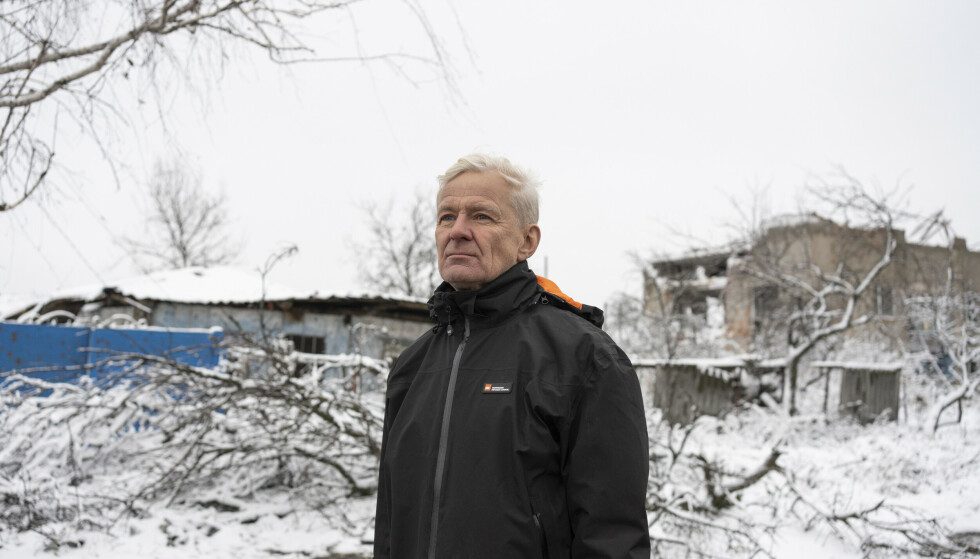It is deeply disturbing to see the massive bombing of civilian targets and civilian infrastructure in violation of international law. Men in ties and uniforms sit safe and sound in heated offices in the Kremlin, in Russian command posts in and out of Ukraine, and decide to blow up supplies of electricity, heat, and water to suffering grandmothers, children, families, disabled people, and pensioners. Widely.
This is what the Secretary General of the Norwegian Refugee Council, Jan Egeland, told Dagbladet. He returned home after staying in several parts of Ukraine, including the major cities of Kharkiv and Kiev, for a week. The impressions were strong for Egeland.
Freezing and no running water. One can imagine a cabin in the countryside in a Norwegian winter without any heat or running water and with holes in the ceiling and walls. Then there will only be suffering, says Egeland.
The Secretary-General was deeply moved when he spoke of the war and the suffering of the civilian population. Several times during the conversation he has to take breaks.
He expresses grave concern about what winter in Ukraine might be like after a long period of Russian attacks against civilians and civilian infrastructure.
– We are very afraid of the collapse of the infrastructure, the collapse of electricity, heating and water in the long term. This is closely related. Without electricity, fresh water pumping systems cannot function. When we were in Kyiv, there was no electricity or electricity in the hotel for a day and a half.

Power outages: Many parts of Ukraine have been affected by prolonged periods of power outages following Russian attacks on civilian infrastructure. Here from Odessa at the end of November. Photo: Oleksandr Gimanov/AFP/NTB
Show more

Power outage visible from space
– great impression
Egeland is no stranger to survival in war zones and conflicts. When he was nineteen, he went to Colombia to do relief work. He also served as the United Nations Special Envoy for Peace Negotiations in the country. In 2015, he was appointed Senior Adviser on the Syrian Peace Negotiations.
He also visited Somalia and Palestine, which for many years have been marked by war and conflict. While about half of the population in these countries are children and youth, in eastern and southern Ukraine it is very different. In many places there are large majorities of the elderly, the disabled, and the handicapped.
– I made a huge impression walking in sleet, sleet and rain in villages in eastern Ukraine where we delivered emergency aid packages with food to elderly people living alone in partially destroyed homes. Seniors here can’t or won’t run away.
– We distribute many hygiene boxes with diapers to the elderly, and we also give them to children in Ukraine. There are a lot of bedridden. I met elderly women caring for their dying male husbands. They said they could not and would not escape.

During the trip to Ukraine, Egeland spoke with many residents of the country. Photo: Myriam Renault/NRC
Show more
No response from the Russians
For the NRC, there are several major challenges in carrying out relief work in Ukraine. One of the biggest is access along the front lines on the Ukrainian side. But the NRC has also tried to carry out relief work in areas controlled by the Russians.
– We had frequent contacts with Russian diplomats, sent direct messages to Lavrov (Russian Foreign Minister Sergey Lavrov, ed.) that we want to carry out humanitarian actions for Ukrainians in the regions controlled by Russia. The answer we get is that we should talk to the local authorities in the occupied areas. And when we contact them, we don’t get any response.

The message has been received: Jan Egeland and the refugee agency have repeatedly tried to ask the Russian authorities, here in the form of Foreign Minister Serge Lavrov, to allow them to carry out humanitarian work in Russian-controlled areas of Ukraine. Photo: the press service of the Russian Foreign Ministry via AP / NTB
Show more

Worse every hour
– crimes against humanity
Egeland does not want to share what he thinks about Russian President Vladimir Putin, but he is clear about what he thinks about the Russians bombing civilians and civilian infrastructure.
We condemn without conditions what we see as a violation of international law. It is a crime against humanity to freeze women, children, the elderly and the disabled. Russian decision makers should hear this all the time. Egeland says that diplomats and other politicians should talk to the Russians and try to persuade them.
When asked if it would be possible to start a dialogue with the Russians in the future, Egeland replied:
– We can’t give up. I am concerned about this rhetoric that there is a military solution. There must be a negotiated final solution. This war could go on for a long time, and for much longer than many people think.
Many military experts believe that it is realistic that Ukraine could expel the Russians from the country. Egeland does not rule it out, but warns that it would be very costly for the civilian population if there is never a negotiated peace solution.
– They can, but it will be destroyed Ukraine. And they would still share an infinitely long border with an infinite number of divided families. There is an army of soldiers out there who talk, but they mostly don’t know about human conditions.

Jan Egeland is clear that hard work must be done for a peaceful solution in Ukraine. Photo: Myriam Renault/NRC
Show more

Fundamentally failed
Norway should do this
Since the outbreak of the war, Norway has donated money, equipment and weapons to Ukraine. People also contributed a lot. The Norwegian Refugee Council Dagbladet reports that they have collected NOK 77.5 million from individuals, associations and municipalities so far this year. Businesses in Norway and internationally also contributed large sums.
Egeland believes there are four things Norway should do in the Ukraine war. The first is to maintain the allocation of humanitarian aid in Ukraine.
The needs are enormous. 14 million people are refugees in or from Ukraine. Norway is a big and good donor to Ukraine. Relief organizations have received substantial funds. Many come from Norway, and even more so from the United States and other countries. It’s the largest humanitarian operation in the world, Egeland says, without comparison.
He also states that Norway, along with European countries, should cooperate to provide assistance so that energy supplies and basic infrastructure are not disrupted.
Since the war broke out, Norway has received nearly 34,000 asylum applications from people from Ukraine, according to figures from UDI. Egeland believes that Norway should accept more Ukrainian refugees.
– We must remember that only about one percent of all Ukrainian refugees will come to Norway. If 70,000 to 80,000 people come to Norway, one percent of the seven to eight million who have left or will leave Ukraine this winter, says Egeland.
He believes that Norway should put pressure on Russia and put pressure on it to stop the bombing in Ukraine.
– The international community must make Russia understand that it is not the soldiers who freeze in the first place. They are out in the open anyway. It’s grandmothers, bedridden patients, and the disabled who can freeze to death, says Egeland.

“Organizer. Social media geek. General communicator. Bacon scholar. Proud pop culture trailblazer.”

